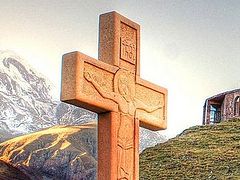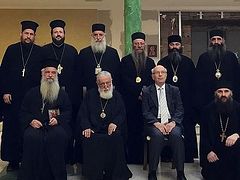From Sept. 30 to Oct. 2 Pope Francis visited the ancient Orthodox nation of Georgia, celebrating Mass in a Tbilisi stadium on Saturday, Oct. 1 for the capital’s small Catholic population.
Hierarchs of the Georgian Orthodox Church were noticeably absent.
As it should be.
The media is variously reporting the absence of any official Georgian Orthodox delegation as a “shun,” a “snub,” and that the Pope was met “with disregard.” That such headlines are false and inflammatory is obvious in that the pope visited the nation by the invitation of the president and His Holiness Patriarch-Catholicos Ilia II himself, who greeted him at the airport and met with him in an official capacity.
Moreover, the pope was welcomed to the Svetitskhoveli Cathedral in Mtskheta where he exchanged speeches with His Holiness in the presence of a number of hierarchs, clergy, monastics, and faithful.
What we see is that, in fact, the pope was met with the same respect given to any visiting dignitary. The pope himself, upon his departure, expressed his gratitude at being so warmly received. But His Holiness Ilia II also respectfully maintained his own integrity and that of the Orthodox faith and Church, given to us by Christ through His Apostles.
At Saturday’s Mass, Pope Francis declared: ““We should work together. We should respect each other and pray together. This is ecumenism.”
It is precisely this ecumenism that the Georgian Orthodox Church understands, and rightfully rejects, not out of any hatred or chauvinism, but the righteous desire to preserve intact the deposit of faith entrusted to the hierarchs and all the faithful.
The Church and its faithful are guided by the dictum “lex orandi, lex credendi”—the rule of prayer is the rule of faith—that is, the Church believes what it prays, and prays what it believes, and therefore, unity of faith is an obvious and necessary presupposition for unity in prayer.
The absence of unity of faith between the Orthodox Church and the Catholic confession is obvious, and so should be the absence of unity in prayer. Mutual respect is not enough to bind us together in Christ, for respect that disregards truth is no respect at all, and it certainly is not love.
In his Oct. 1 speech at Svetitskhoveli Cathedral, the pope invoked the holy Apostle Paul, saying, “Those baptized in Christ, as Saint Paul teaches, have been clothed in Christ. Thus… we are called to be 'one in Christ Jesus' and to avoid putting first disharmony and divisions between the baptized, because what unites us is much more than what divides us.”
In the eyes of the media, the Georgian Orthodox Church’s seeming rejection of the ideal of unity and harmony is a “shun” and a “snub,” but what Pope Francis failed to mention, and which, naturally, the secular media fails to understand, but which those of an Orthodox consciousness can never forget, is that St. Paul spoke not merely of unity in baptism, but rather of One Lord, one faith, one baptism, which bind us together in one body, and one Spirit (Ephesians 4:4, 5). Baptisms not of one faith are indeed not one baptism. Baptism is unto union with the Body of Christ, and therefore, naturally, cannot happen outside of that Body of Christ.
In a statement on the Georgian Patriarchate’s website, the Church reminded the faithful that: “As long as there are dogmatic differences between our churches, Orthodox believers will not participate in their prayers,” which is entirely in keeping with the God-breathed universal canonical Tradition of the Church.
Canon 10 of the Holy Apostles reads: “If one who is not in communion prays together, even at home, let him be excommunicated,” and Canon 45: “A Bishop, or a Presbyter, or a Deacon that only prays together with heretics, should be excommunicated; if he has permitted them to perform anything as Clergymen, let him be defrocked.” Thus, we can see that His Holiness preserved his own good standing in the Church and the resilient witness of the Orthodox faith. Many later canons confirm and expound upon the norms laid down here.
For his part, the Catholic pontiff overlooked the vital dogmatic differences, insisting at his Tbilisi Papal Mass that Catholics ought never to proselytize the Orthodox, which would be “a grave sin against ecumenism,” in light of his belief that Orthodox and Catholics are brothers and sisters in the faith.
For the Orthodox, it would be precisely the notion that we must never seek to bring Catholics into the saving enclosure of the Orthodox Church that would be a sin, and a grave one at that, wholly lacking in love.
The Pope was met with respect and dignity, but not as a right-believing bishop of the true Church. He was neither invited to homilize during any Orthodox divine service, nor to bless the Orthodox faithful, nor was he seated upon any episcopal throne, nor was the liturgical Kiss of Peace exchanged—actions which would only wound the Orthodox conscience of the faithful, causing confusion and anger.
As a wise and discerning shepherd, Patriarch-Catholicos Ilia II maintained a balance between respect for his guest and respect for his own flock and Church, and his own ordination, with all its ensuing responsibilities, setting an example for Orthodox-Catholic interactions, and giving voice to the Orthodox truth in his own speech at Svetitskhoveli Cathedral:
“True faith, humbleness and our traditions—these are the ancient treasures that we preserve and will continue to do so in future. We greet you again and confess that our unity is in the true faith. Only true faith and love will open the path towards our communion.”





As for a universal and infallible jurisdiction of the Pope -- well, we all know that Church history simply doesn't bear that out, as is obvious from the Catholic Church's own notion of doctrinal development, which we reject.
As for the Theotokos - no doubt God was preparing a lineage to bring her forth. St. Gregory Palamas talks a good bit about this. Also, St. John of Damascus, in his Exact Exposition, speaks of her being foreordained, proclaimed in diverse images, etc, but he also speaks of her striving after holiness and becoming the home of all virtue whilst living in the Temple -- nowhere does he proclaim that she had been freed from the taint of original sin.
http://www.interpressnews.ge/ge/sazogadoeba/400010-patriarqi-tceshmariti-rtsmena-thavmdabloba-da-chveni-tradiciebi-es-aris-udzvelesi-saunje-romelsac-chven-vufrthkhildebith.html?ar=A
You can at least run it through some online translators and see that the translation is accurate.
I don't know the reason for the discrepancy in texts.
But even so, the text you have linked to has the Patriarch saying:
"The true faith, humility, contrition and charity make up the shortest way towards salvation ... May God’s will unify Christians on the foundation of the true faith, Amen!"
So his emphasis is, either way, on union through the true faith, not through ecumenism, which the Pope appealed to at his Mass.
Your translations of Patriarch's words are not only wrong but completely distort Patriarch's message. Refer to the official website and English translation at http://patriarchate.ge/geo/address-of-his-holiness-and/
Patriarch has never said what you are trying to impose in your article. He is much more open towards the Roman Church than you state on here.
So if the catholic church is rejected because of these teachings, it means that the very latin saints commemorated by the eastern church tough error.
Since the 4 doctors of the latin church it has been a consensus of the latin fathers & it used to be that the eastern orthodox believed that the Holy Ghost spoke through the Saints & that seeming contradictions therefore could & indeed must be resolved.